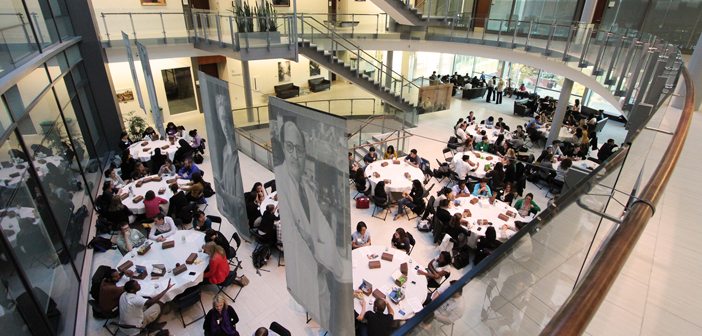When it comes to solving problems within health care, nurses, physicians, and other clinicians can’t work in silos. In order to provide the best care possible for patients, they not only need to work together, but also understand the lens through which each discipline sees and delivers care.
At Johns Hopkins, interprofessional collaboration is a core pillar of the student learning experience. It’s also the catalyst that has launched the Interprofessional Education (IPE) Events, a four-part series built into the curriculum that brings together, for each event, more than 400 students from the Johns Hopkins Schools of Nursing, Medicine, and Public Health, and the Notre Dame of Maryland University School of Pharmacy.
This week, the four professions will meet to dive into a public health problem that is faced within Baltimore and beyond—substance misuse. It’s a growing epidemic that is devastating communities across the world, and students will come together to gain experience working as a team while also learning patient-centered, population-focused ways to solve a health care issue that is not likely to quickly disappear.
To kick off the event, students will meet in groups with representation from each of the four schools to evaluate and discuss a case study of a Baltimore resident who is struggling with an addiction. They will consider questions around causative factors, social determinants of health, how clinicians can play a role, and what unique expertise and knowledge each discipline brings to finding the solution.
Following the group discussions, students’ questions will be answered by a panel of faculty experts, including Dr. Josh Sharfstein, former Maryland Secretary of Health & Mental Hygiene and associate dean for public health practice and training at the School of Public Health, Dr. Deborah Finnell and Dr. Kelly Bower from the School of Nursing, Dr. Megan Buresh and Dr. Ryan Graddy from the School of Medicine, and Dr. Tony Tommasello from Pharmacy. The panel of experts will summarize up-to-date information about ways to address this problem.
“When our students enter the workforce, they are going to be working with people from every sector of health care – physicians, pharmacists, physical therapists, and social workers,” says Dr. Elizabeth Tanner, co-director of the IPE initiative and associate professor at the School of Nursing. “One of the most important skills that we can teach our students is how to work together in teams, recognizing the unique perspectives that all colleagues bring and greater impact that can be had on patient care when delivered through interprofessional collaborative approaches.”
Also behind the IPE initiative are co-director Dr. Laura Hanyok, assistant professor at the School of Medicine, and Dr. Anne Lin, dean of the Notre Dame School of Pharmacy. To them, it’s a practical, yet innovative way of bridging the gap between disciplines during the most formative years of learning before they become licensed practitioners.
“Many schools are still struggling to incorporate IPE into their curricula, but we have successfully done that and even spanned universities,” says Hanyok. “This is often a selling point for students as they see it as health care of the future and an opportunity to network and learn more about the other professions that make up the community of health care providers.”
For this week’s event, the takeaway message is integrated learning and collaboration that will benefit students long after they finish their prelicensure education and move in to the world of practice.
“One of the most effective ways to learn is to do, so what better way to learn about the importance of interprofessional collaboration than by doing just that — meeting with colleagues, addressing important, real issues in health care, and collaboratively finding solutions,” says Tanner.
